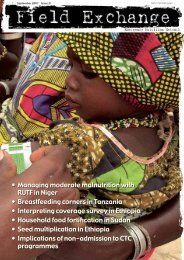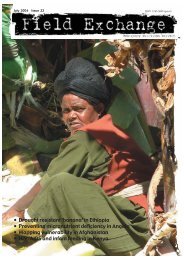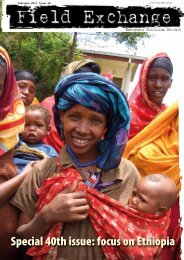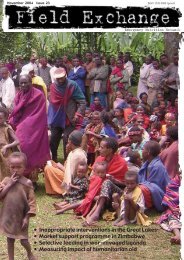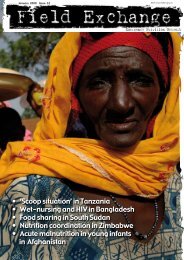Download PDF - Field Exchange - Emergency Nutrition Network
Download PDF - Field Exchange - Emergency Nutrition Network
Download PDF - Field Exchange - Emergency Nutrition Network
Create successful ePaper yourself
Turn your PDF publications into a flip-book with our unique Google optimized e-Paper software.
News &Views<br />
Toolkit for Addressing <strong>Nutrition</strong> in<br />
<strong>Emergency</strong> Situations<br />
A Toolkit for Addressing <strong>Nutrition</strong> in<br />
<strong>Emergency</strong> Situations is now available.<br />
The toolkit was developed by the Capacity<br />
Development Working Group of the IASC<br />
<strong>Nutrition</strong> Cluster with the participation of a<br />
wide range of humanitarian nutrition actors.<br />
The toolkit describes tools and approaches for<br />
12 different nutrition interventions:<br />
• Infant and Young Child Feeding in<br />
Emergencies<br />
• Treatment of diarrhoea with Oral<br />
Rehydration Therapy/Zinc<br />
• Prevention and Treatment of Vitamin A<br />
Deficiency<br />
• Prevention and Treatment of Micronutrient<br />
Deficiencies<br />
• Management of Moderate Acute<br />
Malnutrition<br />
• Management of Severe Acute Malnutrition<br />
• <strong>Nutrition</strong>, HIV and AIDS<br />
• The Psychosocial Components of <strong>Nutrition</strong><br />
The Food and <strong>Nutrition</strong> Technical Assistance<br />
(FANTA) Project have released a Training Guide<br />
for Community-based Management of Acute<br />
Malnutrition (CMAM).<br />
It aims to increase capacity for management of<br />
severe acute malnutrition (SAM) in children by<br />
increasing the knowledge of, and building practical<br />
skills to implement, CMAM in both emergency<br />
and non-emergency contexts.<br />
The training guide is designed for health care<br />
managers and health care providers, who<br />
manage, supervise and implement CMAM. This<br />
includes health care providers who are involved<br />
in health outreach activities, as well as Ministry<br />
of Health officials at the national, regional and<br />
district levels, health and nutrition programme<br />
managers of non-governmental organisations<br />
(NGOs) and United Nations technical staff.<br />
The training guide was produced in collaboration<br />
with Concern Worldwide, Valid<br />
International and UNICEF, with technical input<br />
and review from USAID, the World Health<br />
• <strong>Nutrition</strong>al care for Groups with Special<br />
Needs<br />
• The Use and Role of Food Assistance<br />
• Food Handling, Storage and Preparation<br />
• Household Food Security and Livelihoods<br />
The toolkit offers guidance and support for nutritionists<br />
and humanitarian workers to ensure that<br />
basic guidelines are followed and the basic nutritional<br />
needs of populations in emergencies are<br />
met. It is not intended to be an exhaustive<br />
resource for each intervention presented, but<br />
rather an overview of potential interventions.<br />
The toolkit contains key references and links to<br />
more detailed technical guidance.<br />
The document can be downloaded from the<br />
<strong>Nutrition</strong> Cluster website:<br />
http://www.humanitarianreform.org/humanita<br />
rianreform/Default.aspx?tabid=74<br />
A limited number of copies are available on<br />
mini-CD, contact Josephine Rajasegera,<br />
email: jragasegera@unicef.org<br />
FANTA training guide for CMAM<br />
New online <strong>Field</strong> <strong>Exchange</strong><br />
search facility<br />
In order to improve access to the wealth of<br />
experiences covered in <strong>Field</strong> <strong>Exchange</strong> over<br />
the past 12 years, the entire archive has been<br />
catalogued and is available in a new online<br />
search facility. This development was funded<br />
by the UNICEF-led Inter-Agency Standing<br />
Committee <strong>Nutrition</strong> Cluster.<br />
This facility means it is now much easier to<br />
access single articles on your chosen topic. You<br />
can search using a simple or advanced search<br />
and explore content by category, issue<br />
number, country, article title or type. Individual<br />
Organisation and numerous NGOs. Support for<br />
the development of the guide was provided by<br />
USAID’s Bureau for Democracy, Conflict and<br />
Humanitarian Assistance's Office of Foreign<br />
Disaster Assistance and Bureau for Global<br />
Health's Office of Health, Infectious Disease and<br />
<strong>Nutrition</strong>.<br />
The guide can be downloaded from FANTA-2's<br />
website at www.fanta-2.org<br />
articles can be downloaded, bookmarked or<br />
links/articles emailed to others. Citations are<br />
available at the touch of a button.<br />
A CD version and a printed catalogue will also<br />
be available online and limited copies from the<br />
ENN. Send your request and details to Rupert<br />
Gill, ENN, email: office@ennonline.net, tel:<br />
+44(0)1865 324996 or mail requests to the<br />
usual ENN office address.<br />
As you use this facility, we welcome your feedback<br />
so that we can improve and develop it.<br />
Email any comments to: office@ennonline.net<br />
Food Security<br />
E-learning<br />
Courses and<br />
Training<br />
Materials<br />
from FAO<br />
The EC-FAO Programme (www.foodsec.org)<br />
has developed a series of free Food<br />
Security e-learning courses and related<br />
training materials, designed to support<br />
capacity building and on-the-job training.<br />
The courses are available in English and<br />
French and are being translated into<br />
Spanish. The courses are currently being<br />
used by over 15,000 registered learners all<br />
over the world. Both CD and web-based<br />
versions are available.<br />
Courses include:<br />
• Food Security Information Systems and<br />
<strong>Network</strong>s<br />
• Reporting Food Security Information<br />
• Availability Assessment and Analysis<br />
• Baseline Food Security Assessments<br />
• Food Security Concepts and Frameworks<br />
• Collaboration and Advocacy<br />
Techniques<br />
• Livelihoods Assessment and Analysis<br />
• Markets Assessment and Analysis<br />
• <strong>Nutrition</strong>al Status Assessment and<br />
Analysis<br />
• Food Security Policies – Formulation and<br />
Implementation<br />
• Targeting<br />
• Vulnerability Assessment and Analysis<br />
On-line Access:<br />
1. Register on-line at:<br />
http://www.foodsec.org/DL/<br />
dlregistration_en.asp<br />
2. Log-in with your User Name and<br />
Password. This will take you to the My<br />
Courses page.<br />
3. Choose a course by clicking the ‘Select a<br />
New Course’ button on the My Courses<br />
page.<br />
CD-Rom:<br />
1. Go to the Courses page:<br />
http://www.foodsec.org/DL/<br />
dlcourselist_en.asp<br />
2. Click ‘Request a free copy’ of a specific<br />
course and complete the form.<br />
Resources for trainers<br />
To support trainers, the EC-FAO programme<br />
has created training resources based on the<br />
e-learning courses. Each course includes a<br />
training guide complete with a set of presentation<br />
slides, student notes and class<br />
activities that can be adapted by trainers to<br />
meet their own needs. If you would like to<br />
develop you own courses based on the EC-<br />
FAO e-learning materials, you can access<br />
the Resources for Trainers section at:<br />
http://www.foodsec.org/tr_res.htm<br />
For more information, please write to: information-for-action@fao.org<br />
22



